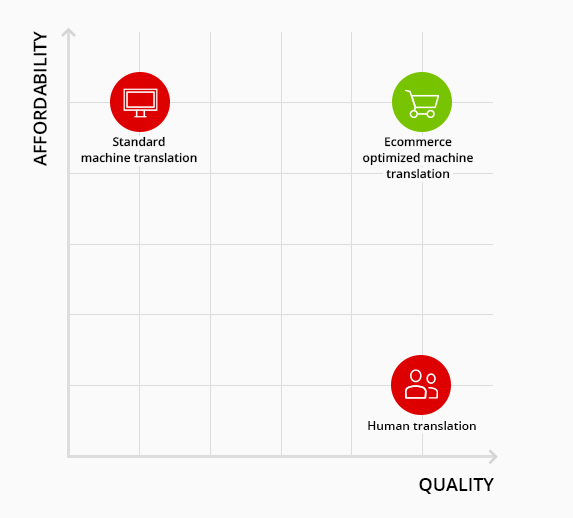To be successful on international marketplaces, ecommerce merchants need to translate and localize their online stores. At present, sellers have to do a great deal of manual work, translating listings, matching product categories, attributes, sizes and … the list goes on.
And today so much manual work is … not really necessary.
Ecommerce sellers can actually automate many processes and use machines. The amazing news is that efficiency doesn’t mean you have to compromise on quality.
Today the development of Artificial Intelligence (AI) makes machines much more human and brainy than they’ve ever been.
They can truly help you rock your ecommerce sales! How? Karolina Kulach, Content Specialist from Webinterpret, explains.
Ecommerce & machine translation
Thanks to AI and machine learning, algorithms can be used to break down data, learn from it and make predictions. This way, machines can be trained to perform specific tasks. With the help of big data analysis, most of the manual work ecommerce sellers are required to do to sell internationally can be carried out on a larger scale.
In fact, a simple raw description will be enough for AI to accurately localize the whole content, map the right category, extract attributes and convert sizes. Machine learning can produce wonderful outcomes: in a super efficient and accurate way.
Machine learning and machine translation have further benefits from the business perspective. For example, years ago Webinterpret had to struggle with many critical errors due to human mistakes despite the fact that the company hires professional, well-trained translators.
After Webinterpret taught the machine to convert sizes based on brands, errors ceased to be an issue. Size conversion accuracy and quality went up on an unprecedented level.
It is humans that have the knowledge, do the thinking and design machines. But it is machines that are fast and more consistent. According to Patrick Smarzynski, CEO at Webinterpret,
Technology combined with the human touch can produce amazing results.

In other words, AI & automation are the key to growing sales of most international ecommerce sellers in the most efficient and hassle-free way.
Automation allows retailers to spend less time on managing their catalogue and more time on their business development and delivering great buyer experience.
Ecommerce automation takes brains
Automatic solutions may seem simple and work … well … automatically, but developing a good solution isn’t a straightforward task. For instance, the machine must identify the right word/s to produce an optimal listing translation. To do so, it’s not enough to simply recognize words and phrases and combine them.
At least not if the expected end result should include keywords that will sell your product.
Consider this. You can very often use more than one word to describe the same item, e.g. trousers and pants. The fact is that the word you decide to use may make a huge difference when it comes to your conversion rates.
In some contexts, online buyers, searching for the same product, are more likely to use the word trousers. In other contexts, pants may be the winner. Ecommerce data analysis helps to establish which keywords will maximize the possibility of selling a specific product.
According to our findings,
Selecting the right words can double the number of transactions.
Further, specific rules and exceptions must be recognized by machines.
For example, machines shouldn’t translate brand names. Think about this: translating the brand name Apple into the name of a fruit in a given language would produce hilarious effects!
Thus, we need a human brain that will teach the machine to perform the task correctly in an efficient and accurate way.

The role of AI is to teach the tool to recognize exceptions to the rule and prevent faulty translation. Then we can benefit from the machine’s speed and consistency.
The bottom line …
To have it all for optimal ecommerce translation, we need both machines AND humans.
AI-based ecommerce translation and localization solution
Ecommerce localization is necessary if you want to maximize your sales potential on global markets. Localization includes all aspects, not only translation, of preparing your online store for growing international sales, e.g.:
- customized translations for specific categories and brands
- currency and size conversion
- low international shipping rates
- local marketing
- SEO
- international trade restrictions.

The goal of ecommerce localization is not to perfectly translate your product offers, but to grow your sales in a data-proven way.
Webinterpret utilizes an AI based, natural language processing solution and autonomous machine-learning to deliver affordable, automated human-quality translation and localization. By fully embracing AI technology, it’s possible to minimize operational time and cost whilst delivering a high-quality, domain-specialized localization process.
The different components are localized according to the specific requirements posed by:
- the marketplace, e.g. length limitations
- the category of the product, e.g. accounting for shoe size conversion between EU and UK or specific vocabulary in electronics
- sellers’ preferences.
This ecommerce optimized machine translation is different from:
- Standard machine translation: it’s built and trained specifically for ecommerce products and it understands the notion of products, attributes, categories and context in a way that standard machine translation cannot.
- Human translation: that is slow and expensive.

In a nutshell
If we take automatic translation and localization solutions for ecommerce purposes, creating them requires a very specific ecommerce context. This is something that standard machine translation and most human translators are not programmed or trained to consider.
Human translation may be great editorial-wise, but is too slow and is likely to produce inconsistent translations/results. Standard machine translation, on the other hand, isn’t programmed for the ecommerce context. As a result, your products may never be found and purchased on foreign markets.
For this reason, international ecommerce experts, analysts, and developers are striving to create machine translation solutions that will help you multiply your revenue in the most efficient and ecommerce-oriented way.
After all…
The goal of successful ecommerce translation and localization is to boost your ecommerce sales.
Fortunately, it’s possible to do it in a reliable and efficient way.

Author’s Bio:
Karolina Kulach is a content marketer and non-fiction writer, specializing in global ecommerce and online sales trends. Educated in Linguistics (MA) and Business Studies (BA Hons). A well-travelled individual with international education & work experience gained in London, Scotland, Poland and Germany. In her spare time buzzing with creative content ideas, including funky rhyming poems.





2 Comments
Well, I never thought the company was on this level of innovation for the better.
From the Friend,
Gabriel
Thanks Gabriel 😉 glad to get some recognition on our effort. We have always tried our best to innovate & bring better values to clients 😉